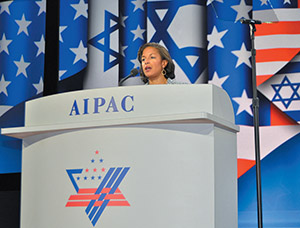
Participating in the annual AIPAC policy conference is always a powerful experience. But the intensity of this year’s conference was especially palpable, taking place only a day before Netanyahu’s historic speech to Congress. The crowds were both electric and unified; I felt connected to my fellow Jews at the conference—and to Am Yisrael as a whole—in a way that I rarely have the opportunity to feel.
On Monday morning, I waited on a security line with thousands of other Jews in advance of the Prime Minister’s speech. At one point, hundreds of us stood crushed together in a very tight space; it was like being on the subway during a particularly busy rush hour. Uncomfortable as it was, I felt a profound sense of connection, as if I was immersing myself in a Mikvah of Jews!
Standing there, I thought of a teaching from Rav Tzvi Hirsch of Ziditchov (1763—1831), the founder of the Zidichov Chassidic dynasty. The Ziditchover taught: “Mikvah Yisrael Hashem” (Jeremiah 17:13) means, simply, “The hope of Israel is God.” But the Ziditchover translated this verse differently; “Mikvah Yisrael Hashem” can be read as “The people of Israel are God’s Mikvah (ritual bath).” And so every Friday afternoon, in preparation for Shabbos, the Ziditchover would gather a group of Jews and ask them to stand in a circle, while he would lie down on the ground in the middle of the circle—literally surrounded on all sides by the people of Israel. And he would say: “I am immersing myself in the Mikvah of God!”
Another unforgettable moment took place during National Security Advisor Susan Rice’s speech on Monday evening. Only a few days before the conference, Rice angered the entire pro-Israel community by stating that Netanyahu’s planned speech to Congress could destroy “the fabric of the America-Israel relationship.” And so, understandably, the 16,000 AIPAC delegates were not particularly receptive to her argument that the deal currently being negotiated with Iran was the “best possible deal” that could be negotiated under difficult circumstances.
Despite the emotion in the room, not one person booed her; the decency and self-control displayed by thousands of people was truly extraordinary. Instead, the crowd expressed its disagreement with Rice by deliberately cheering at precisely the “wrong” moments, and remaining relatively quiet at the “right” ones. When Rice said, “I know some would argue we should just impose sanctions and walk away,” the crowd erupted into a standing ovation. But when she contended demanding that Iran forgoes its enrichment capacity entirely “is not a viable negotiating position,” the room was silent; all she received was a golf clap. It was a respectful—and extraordinarily effective—way of expressing dissent.
“Who is like your people Israel, a unique nation on this earth?”
By Rabbi Elie Mischel









